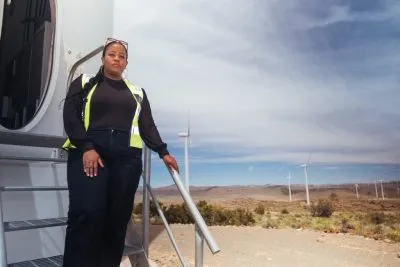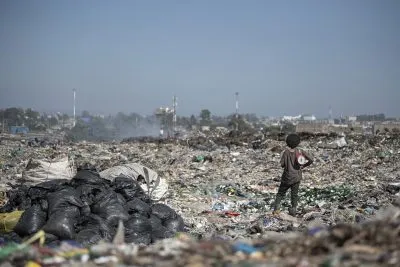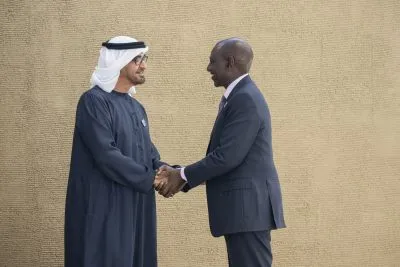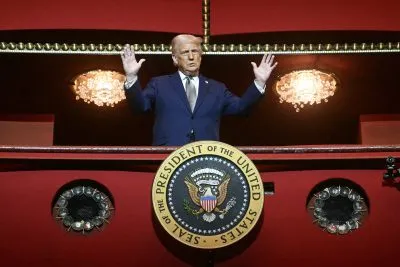Energy is probably the single most important component in Africa’s drive for accelerated economic growth. Financing this sector is equally crucial. Ecobank, Africa’s giant multilateral, is taking a closer interest in various aspects of the energy market, including renewables. Rolake Akinkugbe, Ecobank’s head of energy research, outlines the bank’s perspective to Stephen Williams.
nergy, or the lack of it, is probably the most significant factor limiting sub-Saharan Africa’s economic development. It affects all aspects of life. It is also very big business. Investments run into the billions.
Ecobank, with a presence in 35 countries worldwide (32 in Africa) takes the energy business very seriously. It has a dedicated energy desk within its research department. Other desks within the department deal with items such as soft commodities and fixed income.
Rolake Akinkugbe is head of energy research. “As a bank, we are present in most of the oil producers in Africa,” she says, “and we’re present in all the refinery countries in Africa, except of course South Africa where we’re not involved from an operational point of view. We also have a huge commodity finance business, and almost 60% of that commodity finance business is energy – refined petroleum products, crude oil and the like – so we see a lot of energy finance. When it comes to relationships between refiners in one African country and suppliers in another for instance, that’s a huge and important trading commodity finance line for the bank.” This fits well with one of Ecobank’s founding principles: underwriting and encouraging intra-African trade.
Akinkugbe is one of more than 10,000 Ecobank Corporate and Investment Banking professionals of the Ecobank Group. Born in Nigeria, she was schooled in both her home country and the UK before going on to the London School of Economics where she read for both her achelor’s and Master’s degrees. She is a classically trained pianist, who has also taken up playing jazz piano. “It’s a serious hobby,” she explains. She travels extensively throughout ‘Middle Africa’ – a term coined by Ecobank to describe the swathe of the continent south of the Magreb and north of South Africa. It extends from Senegal in the West to Kenya in the East and from Niger in the north to Botswana in the South. It is home to nearly 800m people and has a combined GDP of more than $1 trillion.
Africa’s vast oil reserves have historically dominated the energy mix of African countries. Currently, oil accounts for some two fifths of the world’s energy consumption, yet there have been few eras of greater change, nor of greater excitement, for Africa’s hydrocarbon industries. For example, the East Africa offshore gas reserves discoveries look like almost matching West Africa’s, thereby doubling the continent’s total and having the distinct advantage of geographically being more readily able to supply
Asian markets.
What has been changing within the Ecobank portfolio of energy investments is a more significant involvement in upstream ventures. “That’s something we typically haven’t done in the past, because it’s usually the big global players that have a lot of the capabilities and capacity to do that,” says Akinkugbe, “but where there’s some sort of local syndication, Ecobank is usually quite attractive to global counterparties. We bring an unmatched element of local knowledge through the Ecobank affiliate in many countries. We’re also playing a greater role in midstream finance, i.e. financing the pipelines, storage tanks, terminals and other types of energy infrastructure.”
Ecobank is becoming increasingly interested in investing in renewable energy. “We are looking at a couple of such projects now in Sierra Leone and Liberia. The renewable sector is still very much in its infancy now,” she says. “I don’t understand why African countries haven’t bought into this new dynamic more enthusiastically, but it’s certainly an important aspect for us – and also because we bank a lot of players on the ground from a corporate banking perspective, so many of them will have projects in the pipeline.”
She points out that national policies affect what happens in the renewable energy sector. “In the past we would have adopted a wait and see approach, but now we’re very keen on getting involved. As long as the economics around the project make sense, we would be quite keen to get involved in it.”
Although Ecobank’s 4.6% stake in the African Finance Corporation gives it an interest in Africa’s biggest wind farm – the €61m 26MW project in Cape Verde, most of its renewable energy investment interests, to date, are in biofuel projects.
Can Africa close the energy gap? “Yes, I’m optimistic in so far as there’s a recognition of the extent of the problem,” replies Akinkugbe. “I’m also optimistic because whatever is a challenge in Africa is also an investment opportunity. There are certain conditions that need to be right for that opportunity to be realised”.
For power generation, issues of regulation and other obstacles to reform loom large. Citing Nigeria, she says: “If you have an industry that thrives around diesel importation or the trade in generators, then how can you really build a viable, sustainable power industry? In fact, Africa has the resources that can be harnessed to generate power, but a major part of the problem is that the infrastructure is lacking, so it’s a vicious cycle. The infrastructure gap itself is creating even more of an energy gap.”
Akinkugbe believes that Africa’s gas reserves can offer a powerful development mechanism for the continent – not just as an energy feedstock but in order to manufacture fertiliser to boost agricultural productivity or the petrochemicals used extensively in modern industry. It is just that the ‘vicious cycle’ she commented upon is impeding its implementation.
“If you want to pipe gas to a power plant, a fertiliser factory or petrochemical plant,” she says, “then you need to build a gas pipeline in order to do that. Who has the capital to invest in a gas pipeline? Not the African governments on their own, so the multilateral institutions have to play a big role in that – but then you also need new partners like the Chinese, who have the capability and the ‘easy’ money.”
However, if the funding gap can be closed, the future for energy generation in Africa is bright, and its transformative impact would be significant. “Think about the potential multiplier effect of a transformation of Nigeria’s power sector. That would shave up to 60% of the business costs of a small manufacturing company in Lagos on a monthly basis, and if they were to pump that saving back into the business, for an SME, the potential repercussions and the impact on economic growth would be huge. So if governments could focus on this as a policy objective over the next decade, every other thing would just follow suit. It is a really important fundamental for economies.”
Akinkugbe stresses that when it comes to Africa’s energy policy, there must be high-level political recognition that the current situation regarding energy poverty is unacceptable and that change is needed. Words and good intentions are not enough. “We must also find alternative sources of power other than hydrocarbons. For example, Africa has had hydropower for many years but because of geopolitical issues it hasn’t developed to the extent it should have. When you talk about building a dam, you are usually involving several countries at a time – so that in itself can be a problem, but we have huge water-energy resources on the continent.
She adds that Africa is rich in another form of energy – solar. “I believe that, much in the same way that Africa has managed to leapfrog into the technological age of telecoms, why can’t we just move from conventional sources of power generation to solar energy?” As to why this has not yet happened, she observes: “The policy thinking has been less than progressive, and energy subsidies, for instance, have been a real issue, creating huge bottlenecks which need to be removed. Until it becomes cheaper to go for those projects than conventional sources of energy, investors will probably tend to ignore them. But I am optimistic Africa can sort these out.”
Want to continue reading? Subscribe today.
You've read all your free articles for this month! Subscribe now to enjoy full access to our content.
Digital Monthly
£8.00 / month
Receive full unlimited access to our articles, opinions, podcasts and more.
Digital Yearly
£70.00 / year
Our best value offer - save £26 and gain access to all of our digital content for an entire year!

 Sign in with Google
Sign in with Google 





